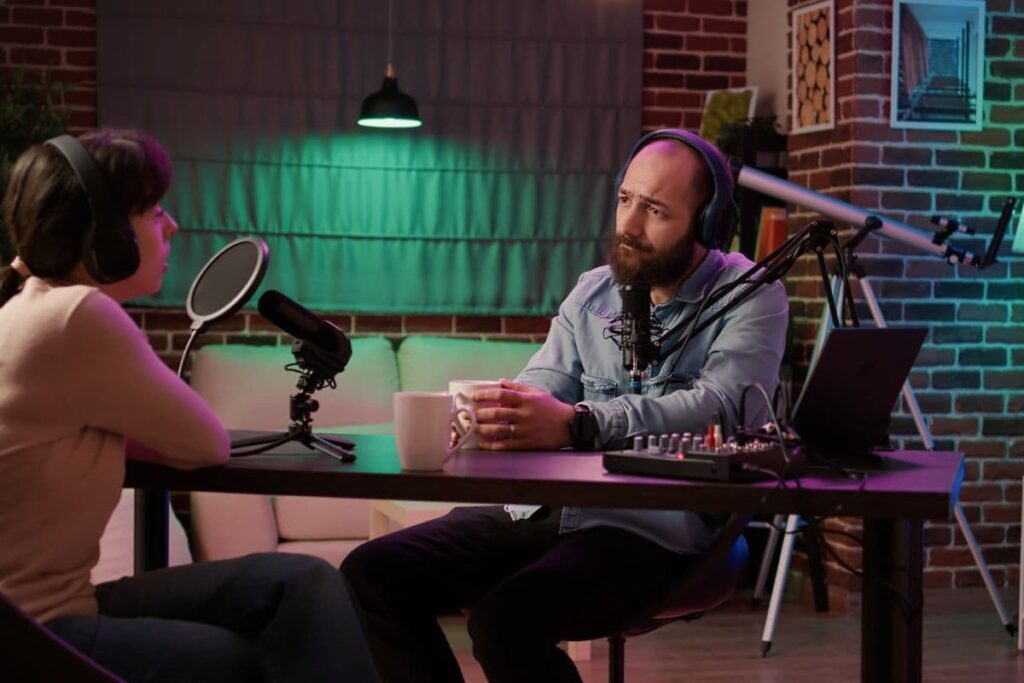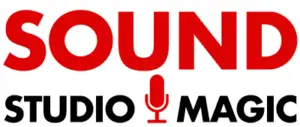Starting a podcast can be confusing at first, especially if you’re not knowledgeable about audio equipment and don’t know where to start. There are tons of audio equipment you’re bombarded with, and all of them may seem useful, but that doesn’t mean they will be useful for your specific situation. One such piece of equipment is a mixer, a ubiquitous thing in audio recording which might not be necessary if you’re just starting out.
You don’t need a mixer for a two-person podcast. It’s much better to invest in an audio interface and do the mixing in your digital audio workstation. A high-quality audio interface goes a longer way for this kind of podcast. A mixer can be useful if you’re doing a live show, but is not necessary.
If you’re starting a podcast with a friend and are unsure what gear you need, this guide will help you. We’ll go over why and why not you should use a mixer and what gear you need to get your podcast going.
Table of Contents
- Why You Don’t Need a Mixer for a Podcast
- What Equipment Do You Need To Start a Podcast?
- Final Thoughts

Why You Don’t Need a Mixer for a Podcast
Getting a mixer seems reasonable when recording any kind of audio, at least initially. It has been the default option for recording vocals and music for decades, so it has to be a must in any type of recording, right?
This might seem even more intuitive when you want to record two people speaking simultaneously. A good USB microphone will probably be more than enough if you’re only recording yourself or have a Zoom podcast. Not to say that you can’t use any other equipment, but you can do without it.
You need more than just a USB microphone when recording two people simultaneously. Theoretically, you could both speak into the same microphone, but the sound quality would either be bad, or there would be lots of awkward silences where you pass the microphone to each other.
Therefore, a mixer seems like a logical conclusion. After all, it mixes different input signals into one signal your computer receives, so it might be exactly what you need. However, you can easily get amazing sound quality without one.
It’s much better to get an audio interface than a mixer.
An affordable piece of equipment like a Focusrite Scarlett 2i2 will get the job done at a fraction of the price of a mixer and with much less effort.
It’s much better to get an audio interface than a mixer. An affordable piece of equipment like a Focusrite Scarlett 2i2 will get the job done at a fraction of the price of a mixer and with much less effort.
An audio interface will mix the signals from your microphones for your computer as well as any mixer. To make things even better, it doesn’t require an additional person behind the camera to control the mixer. You plug in your microphones in your audio interface, the interface into the computer, and you’re ready to go.
If you’re limited to only two people, you’ll have difficulty controlling the mixer, and you won’t reap its benefits. There’d be many awkward breaks and cuts, which would not positively influence the listening experience.
You can do all the editing in your DAW very easily after you record your audio. Since you’re only recording vocals, it won’t be difficult to fine-tune the editing and mix everything the way you like it. It can be easily done even if you want to add some special effects or intro music.
A mixer could serve the same purpose, of course, but it just isn’t necessary. You can get the same result for much less money. You’d be much better off if you invested the money into a good pair of microphones.
When Do You Need a Mixer?
A mixer can be of great help if you’re doing a live show where people can call and talk to you. Of course, you also need a sound guy behind the camera to operate the mixer. Using a mixer will give much control in that scenario and make the whole thing run much more smoothly.
A mixer can also be useful if you’ve got a bigger project with lots of different materials you want to show. If there are a lot of audio and video clips that you want to show to your audience, it will come in handy. However, this can also be done in other ways, so even in that case, it’s not a must to have a mixer.
If you decide to buy a mixer for your podcast, I recommend reading my guide on how to choose a mixer before committing to an option. How to Choose an Audio Interface or Mixer for a Studio
What Equipment Do You Need To Start a Podcast?
Even though finding the right equipment for a podcast can be intimidating, it is actually quite simple.
There are only a few things you need:
- Two microphones with stands
- An audio interface
- A digital audio workstation
- A computer
Let’s examine what you should look for when buying gear for your podcast.
Microphones and Stands
Don’t be cheap when buying a microphone. However, you don’t have to blow your whole budget on them. A pair of SM58s will get the job done. Rode is also a very popular option for podcasting. Simply put, any decent vocal microphone will get the job done.
A microphone stand that is sturdy and reliable will work just fine. A popular option is the Neewer Boom Scissor Stand, but you can go for anything as long as it won’t break in half while recording.
Audio Interface
The most popular option is the Focusrite Scarlett. It is a very versatile tool used in recording music as well as recording podcasts. It is also very reliable, so you can rest assured it will do a great job. If you have a different audio interface, use it, but make sure it’s high-grade enough. You don’t want buzzing and other noises to interrupt your podcast.
Digital Audio Workstation
You can use any DAW that you find convenient. GarageBand and Reaper are popular choices, but many people have gotten great results with simple tools such as Audacity. You probably don’t need an abundance of options, so anything you’re comfortable with will work fine.
Computer
You don’t have to have a beast of a computer. Anything with a decent processor and RAM will do. However, going below an i5 processor and eight gigabytes of RAM might cause problems. Of course, it’s manageable to record with a worse computer, but you shouldn’t torture yourself.
Final Thoughts
That does it for today’s post. We hope you’ve picked up some useful advice and know what you’re looking for. As long as you have a decent audio interface and microphones, you’ll be able to record high-quality podcasts. Good luck with your future podcast!
- Review of the ALABS IRON MINI-WL: A Powerhouse Wireless Microphone - October 4, 2023
- What is a Saturator in Music Production: A Brief Explanation - May 11, 2023
- What Are Rotary DJ Mixers? An Overview - May 11, 2023
SoundStudiomagic.com is a participant in the Amazon Services LLC Associates Program, an affiliate advertising program designed to provide a means for sites to earn advertising fees by advertising and linking to Amazon.com. We also participate in other affiliate programs which compensate us for referring traffic.

